Facial Recognition - Nigeria
Nigeria- The market size in the Facial Recognition market is projected to reach US$26.49m in 2025.
- The market size is expected to show an annual growth rate (CAGR 2025-2031) of 16.42%, resulting in a market volume of US$65.97m by 2031.
- In global comparison, the largest market size will be United States (US$1.75bn in 2025).
Definition:
Facial recognition, as part of computer vision, is a technology that involves the identification and verification of individuals by analyzing and comparing unique facial features. It uses algorithms to capture, analyze, and match facial patterns from images or video frames. By extracting key facial landmarks and characteristics, such as the distance between the eyes, the shape of the nose, and the contours of the face, facial recognition systems can accurately recognize and authenticate individuals. The applications for this technology are diverse and include the areas of access control, surveillance, user authentication, and personalized experiences in digital platforms.
Additional Information:
The market comprises two key performance indicators: market sizes and market sizes by industry. Market sizes are generated by the funding amount of Computer Vision companies. Key players of the market include companies such as Nvidia, Intel, and IBM.
For more information on the data displayed, use the info button right next to the boxes.
- Technologies that use machine learning algorithms to analyze and identify human faces in digital images and/or videos, such as face detection and recognition software
- Products and services that use facial recognition technology, such as security systems, mobile devices, and augmented reality apps.
- Technologies that do not rely on facial recognition, such as voice recognition and image recognition technologies that do not specifically target faces
- Products and services that do not use facial recognition technology, such as physical goods and traditional customer service support.








